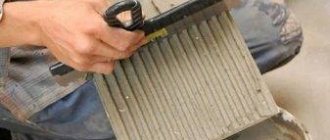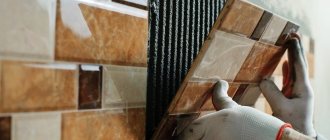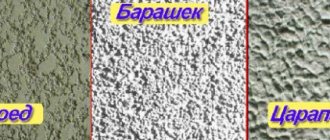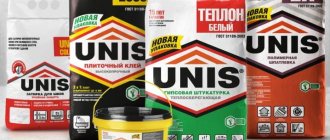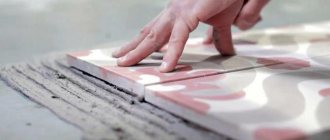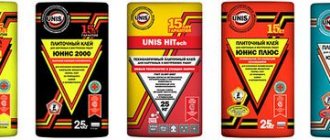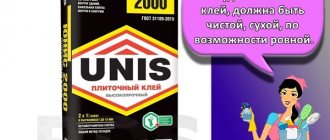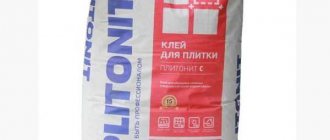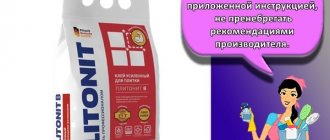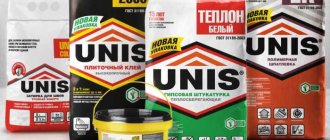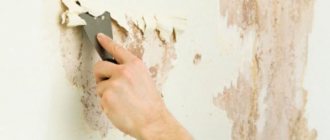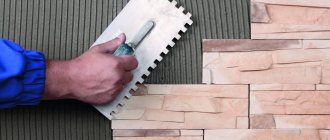Features of Eunice glue
To begin with, let’s take a look at the characteristics of Eunice tile adhesive in relation to analogues of other brands. The fundamental characteristics of Unis Plus and other Unis tile adhesives include:
- High adhesion properties. Products from this manufacturer adhere firmly to a variety of types of cladding.
- Guaranteed resistance to tile peeling. Thanks to its carefully thought-out composition, the adhesive ensures a strong connection between the tiles and wall or floor surfaces.
- Compatible with the "Warm Floor" heating system. Unlike low-quality adhesive mixtures, Eunice tile adhesive is suitable for finishing floor surfaces with electric and water heating mechanisms.
- Possibility of laying tiles on tiles. It often becomes a key factor in choosing an adhesive mixture for those who expect to perform quick repairs on a small budget.
- Laying tiles starting from the top of the wall. If it is more convenient, then it is not necessary to cover the wall surface from its lower part.
- Use in institutions with high sanitary and hygienic requirements. Unis products are absolutely harmless, therefore they are applicable in clinics, medical, preventive and health institutions for both adults and children.
Leading manufacturers
Various adhesive mixtures with which you can glue porcelain stoneware and ceramic tiles are produced by hundreds of domestic and foreign companies. In order not to study the range of each of them, experts advise giving preference to the most famous brands. They produce high-quality glue that ensures reliable fixation of floor or wall coverings.
Best manufacturers:
- KNAUF;
- Unis;
- Litokol;
- Ceresit;
- Weber;
- Perfect.
Glue selection
Comparative table of dry mixes for laying tiles from Eunice:
| Name / Scope of use | FIX | XXI | 2000 | HiTech | Plus | Pool | Granite | Belfix |
| For outdoor use | — | —/+* | + | + | + | + | + | + |
| For heated floors | — | — | — | — | + | + | + | + |
| For plinth | — | — | — | — | — | — | + | — |
| For difficult bases | — | — | — | — | + | + | + | + |
| For glass mosaic | — | — | — | — | — | — | — | + |
| For ceramic tiles | + | + | + | + | + | + | — | + |
| For stone | — | — | + | + | + | + | + | + |
| Porcelain tiles 30x30 | — | + | + | + | + | — | + | + |
| Porcelain tiles 45x45 | — | — | + | + | + | — | + | + |
| Porcelain tiles 60x60 | — | — | + | + | + | — | + | + |
| Porcelain tiles over 60x60 | — | — | — | — | — | — | + | — |
| Approximate** price for 25 kg (RUB) | 188 | 184 | 220 | 242 | 292 | 384 | 345 | 418 |
* Yunis 21 tile adhesive is produced in two versions: only for interior work (produced at a plant in Moscow) and for interior/exterior work (produced in Chelyabinsk and Ulyanovsk).
Reviews
Customers like Eunice's tile adhesive. Various mixtures are popular among craftsmen and amateurs. The glue is easy to use, has low consumption, and the price fully corresponds to the quality. Some products still receive more good reviews because they are universal. Glue is sold in bags of 5 and 25 kg, so you can always calculate the required amount.
Its advantages include accessibility; glue can be bought at almost any hardware store. However, experienced craftsmen on the forums note that now the glue from Eunice has changed its composition, which is why the quality has become worse.
Important advantages include a strong connection and good resistance to moisture. It is also good that after mixing it remains in working condition for a relatively long time - 3-5 hours.
Eunice glue can be purchased for a variety of purposes, but it is important to make the right choice. The compositions should be selected taking into account the size of the tile, weather conditions, and base material. Universal glue is not always suitable; it is better to take narrowly targeted products.
Eunice tile adhesive (2 videos)
Clay Eunice (29 photos)
Types of adhesive mixtures from Unis and technical characteristics
The most popular adhesives in the Unis line are Unis Plus and Unis 2000. The company also produces specialized compounds and progressive adhesives made using the most modern technologies. All adhesives are packaged in packages of 5 and 25 kg. It is important to store any mixture correctly: leave it only in a dry room, and on a wooden pallet so that it does not get damp. The shelf life under proper conditions is 12 months.
Eunice Plus
Universal tile adhesive Eunice Plus for laying all types of tiles, mosaics, porcelain tiles and stone.
The strongest adhesive of all types from Eunice for ceramic tiles and porcelain stoneware - adhesion 1.25 MPa, load withstand - 100 kg/m². Suitable for interior and exterior work (with the exception of plinth cladding), for complex bases (you can lay them on old tiles) and heated floors. Can be used in children's institutions.
The base must be made of non-deforming concrete (including cellular types), cement, brick or gypsum (plasterboard, gypsum fiber).
Specifications
| Work temperature | +5 °C to +30 °C |
| Mixing proportions | 1 part water to 4.5-5.5 parts dry mixture |
| Optimal layer thickness | 3—15 mm |
| Consumption when applied with a 6x6 mm comb | 3.5 kg/m² |
| Minimum solution lifetime | 180 minutes |
| Working time (after application to surface) | 20 minutes |
| Tile adjustment time | 10 minutes |
| Time before walking | 24 hours |
| Adhesion to substrate | 12.5 kg/cm² (1.25 MPa) |
| Weight held | 100 kg/m² |
| Frost resistance | More than 35 cycles |
| Operating temperature | -50 to +70 |
| Packing | Bags 5 and 25 kg |
Unis 2000
Yunis 2000 tile adhesive is suitable for laying ceramic tiles and porcelain stoneware (up to 60x60 cm), inside and outside buildings, on walls or floors. Allows you to level out unevenness of the base during installation up to 15 mm. Can be used on a solid base made of concrete, plaster, cement, brick. Suitable for children's institutions.
Specifications
| Work temperature | +5 °C to +30 °C |
| Mixing proportions | 1 part water to 4.5-5.5 parts dry mixture |
| Optimal layer thickness | 3—15 mm |
| Consumption when applied with a 6x6 mm comb | 3.5 kg/m² |
| Minimum solution lifetime | 180 minutes |
| Working time (after application to surface) | 10 minutes |
| Tile adjustment time | 10 minutes |
| Time before walking | 24 hours |
| Adhesion to substrate | 10 kg/cm² (1 MPa) |
| Weight held | 80 kg/m² |
| Frost resistance | More than 35 cycles |
| Operating temperature | -50 to +50 |
| Packing | Bags 5 and 25 kg |
Yunis 21
Yunis 21 - tile adhesive for standard work.
It is suitable for external and internal cladding with standard tiles on floors and walls. Suitable for damp and freezing areas. Porcelain tiles can only be laid small (up to 30 cm) and only on indoor floors. Attention! The mixture, which is made at the Moscow plant, is suitable only for interior work.
Specifications
| Work temperature | +5 °C to +30 °C |
| Mixing proportions | 1 part water to 4.5-5.5 parts dry mixture |
| Optimal layer thickness | 2—10 (15) mm |
| Consumption when applied with a 6x6 mm comb | 3.5 kg/m² |
| Minimum solution lifetime | 180 minutes |
| Working time (after application to surface) | 15 minutes |
| Tile adjustment time | 10 minutes |
| Time before walking | 24 hours |
| Adhesion to substrate | 5 kg/cm² (0.5 MPa) and 7.5 kg/cm² (0.75 MPa) |
| Weight held | 40 kg/m² |
| Frost resistance | More than 35 cycles |
| Operating temperature | From -50* to +50 |
| Packing | Bags 5 and 25 kg |
* Operation at sub-zero temperatures is possible only 28 days after installation and in the absence of constant contact with water. ** There are 2 types of UNIS XXI: only for interior work (produced at the plant in Moscow) and for interior/exterior work (produced in Chelyabinsk and Ulyanovsk). The maximum thickness of the mixture layer for internal work is up to 10 mm, for external work - up to 15 mm. The adhesion strength is 0.5 and 0.7 MPa, respectively.
Eunice HiTech
The HiTech mixture is indispensable when facing complex bases: ceilings, walls, floors. Laying can be done not only using the standard method, but also from top to bottom. It has an increased solution and installation life for ease of use. Suitable for children's and medical institutions. The bag is enough to cover 7 square meters.
Specifications
| Work temperature | +5 °C to +30 °C |
| Mixing proportions | 1 part water to 4-5.5 parts dry mixture |
| Optimal layer thickness | 3—15 mm |
| Consumption when applied with a 6x6 mm comb | 3.5 kg/m² |
| Minimum solution lifetime | 300 minutes |
| Working time (after application to surface) | 25 minutes |
| Tile adjustment time | 15 minutes |
| Time before walking | 24 hours |
| Adhesion to substrate | 10 kg/cm² (1 MPa) |
| Weight held | 50 kg/m² |
| Frost resistance | More than 35 cycles |
| Operating temperature | -50 to +50 |
| Packing | 25 kg bag |
Eunice Granite
Yunis Granite tile adhesive is suitable for laying large and heavy slabs of natural stone or porcelain stoneware on the floor, walls, façade, and plinth. Laying on old tiles or a heated floor system is acceptable. The consistency of the glue prevents slipping during hardening. Suitable for children's institutions.
UNIS GRANIT tile adhesive has increased adhesion - 1.5 MPa. For comparison: Hercules Elastic GM-195 glue has the same indicator, and Ceresit SM 17 has an adhesion of 1.3 MPa (for other mixtures from these manufacturers it is even lower).
Specifications
| Work temperature | +5 °C to +30 °C |
| Mixing proportions | 1 part water to 4.4-5.5 parts dry mixture |
| Optimal layer thickness | 3—10 mm |
| Consumption when applied with a 6x6 mm comb | 3.5 kg/m² |
| Minimum solution lifetime | 180 minutes |
| Working time (after application to surface) | 15 minutes |
| Tile adjustment time | 10 minutes |
| Time before walking | 24 hours |
| Adhesion to substrate | 15 kg/cm² (1.5 MPa) |
| Weight held | 100 kg/m² |
| Frost resistance | More than 35 cycles |
| Operating temperature | -50 to +50 |
| Packing | 25 kg bag |
Eunice Belfix
Unis Belfix adhesive has a white color for working with complex types of tiles (glass mosaic, marble, natural stone, etc.), which can be damaged by a regular cement mixture. Has increased elasticity and frost resistance. Used for wall and floor cladding, in water tanks, wet rooms, outdoors, can be used on difficult substrates and heated floors. Suitable for grouting joints. It is more expensive than other types - 418 rubles per 25 kg.
Specifications
| Work temperature | +5 °C to +30 °C |
| Mixing proportions | 1 part water to 4-5 parts dry mixture |
| Optimal layer thickness | 3—10 mm |
| Consumption when applied with a 6x6 mm comb | 3.5 kg/m² |
| Minimum solution lifetime | 180 minutes |
| Working time (after application to surface) | 15 minutes |
| Tile adjustment time | 15 minutes |
| Time before walking | 24 hours |
| Adhesion to substrate | 10 kg/cm² (1 MPa) |
| Weight held | 80 kg/m² |
| Frost resistance | More than 75 cycles |
| Operating temperature | -50 to +70 |
| Packing | Bags 5 and 25 kg |
Unis Fix
Cheap, but weak glue with increased consumption. Difficult to find on sale. Suitable for covering walls and floors with regular tiles in rooms with normal and high humidity (bathroom, kitchen, terrace, balcony).
Specifications
| Work temperature | +5 °C to +30 °C |
| Mixing proportions | 1 part water to 4.5-5.5 parts dry mixture |
| Optimal layer thickness | 3—15 mm |
| Consumption when applied with a 6x6 mm comb | 3.5-5 kg/m² |
| Minimum solution lifetime | 180 minutes |
| Working time (after application to surface) | 10 minutes |
| Tile adjustment time | 10 minutes |
| Time before walking | 24 hours |
| Adhesion to substrate | 5 kg/cm² (0.5 MPa) |
| Weight held | 30 kg/m² |
| Frost resistance | More than 75 cycles |
| Operating temperature | -50 to +70 |
| Packing | 25 kg bag |
Eunice Pool
Adhesive for facing stone, ceramic tiles, mosaics, water tanks and wet rooms. Suitable for external and internal work, complex substrates, laying on warm floors, old tiles.
Specifications
| Work temperature | +5 °C to +30 °C |
| Mixing proportions | 1 part water to 4.4-5.5 parts dry mixture |
| Optimal layer thickness | 3-6 mm |
| Consumption when applied with a 6x6 mm comb | 3.1 kg/m² |
| Minimum solution lifetime | 180 minutes |
| Working time (after application to surface) | 10 minutes |
| Tile adjustment time | 10 minutes |
| Time before walking | 24 hours |
| Adhesion to substrate | 5 kg/cm² (0.5 MPa) |
| Weight held | 60 kg/m² |
| Frost resistance | More than 35 cycles |
| Operating temperature | -50 to +70 |
| Packing | 25 kg bag |
Recommendations
To choose the appropriate composition, you need to clearly understand exactly what tasks the adhesive composition for tiles should perform.
It is recommended to choose more expensive types of compounds from Yunis; they have increased adhesion and are also resistant to low temperatures and moisture, which is very important.
If you need to clad an ordinary room, an excellent option would be to use the universal composition Eunice Plus; it is suitable for both internal and external decoration of walls and floors, terraces or facades with the base of a building.
Scope of use
The scope of application of glue is very wide. Yunis is suitable for repair work inside and outside the building, reliably fixing the material to the base.
The safe composition and the absence of a sharp unpleasant odor allows the adhesive solution to be used for cladding medical and children's institutions and houses.
The high level of heat resistance allows you to use Eunice when installing heated floors. Frost resistance makes it possible to lay porcelain stoneware or natural stone on building facades.
Unis Pool
The waterproof material copes well with the task of fixation in difficult operating conditions. Therefore, it is often used for installing ceramic or stone tiles in rooms with high levels of humidity, as well as for laying mosaics in swimming pools and water tanks. The product can also be used for external cladding work.
Eunice Pool
The material is consumed a little more economically than analogues from this series; when using a 6x6 mm spatula, 3 kg will be enough for 1 m2. Price – 470 rubles.
Advantages and disadvantages
The main advantages of the Eunice adhesive mixture:
- High level of elasticity, suitable for fixing to a moving base (for example, wood). Fills in all the unevenness.
- Good adhesion, provides strong and reliable adhesion to the base. Allows you to lay it from bottom to top and prevents it from slipping.
- Wide range of applications. Suitable for external and internal work.
- High heat resistance allows the adhesive mixture to be used for heated floor coverings. It does not heat up due to high temperatures, and the fixation does not become worse.
- Dries quickly.
However, it has a number of disadvantages. These include the speed of drying - it will have to be diluted in small portions, which takes a lot of time. If this is not done, it will lose most of its properties, and the master will waste his money.
How to calculate the consumption of Eunice glue?
Many consumers are concerned about the question of how to determine the consumption of Eunice glue, so as not to make a mistake with its quantity: purchase not enough or, conversely, too many packages. To avoid such a nuisance, you will need to accurately calculate the total coverage area and navigate the thickness of the applied adhesive layer.
In addition, you can simply carefully study the instructions from the manufacturer, which are printed on each package of products. A detailed description will make it possible to correctly calculate the volume of glue needed.
There are also calculators on the Internet that allow you to quickly and effortlessly calculate the required volume of adhesive. To do this, just enter a specific coverage area into the system. Then indicate the type of product used, and the online calculator will give you the estimated cost of glue in kilograms.
How long does it take to dry?
Curing of the glue takes place in 3 stages:
- Working structure stage 15–25 min. During this period, the solution stops spreading under its own weight. The laid cladding elements can be adjusted and moved without cracking the mortar.
- Primary cohesion stage. Usually 24 hours. After this, you can walk on the tiles and treat the space between the tiles with grout. But the solution still contains a large amount of moisture.
- Final curing. Depending on the type of glue and the location of the work, it can last 7–18 days. At this stage, the glue dries completely and gains maximum strength and adhesion.
Eunice tile adhesive: step-by-step instructions
Let's look at the instructions for using Unis tile adhesive. To carry out finishing work at home without errors, follow the following steps one by one:
- Preparing the surface. We remove old remains of building materials and degrease the coating. Level the base. We prime with special compounds to ensure a high-quality screed.
- Mix the glue solution in strict accordance with the manufacturer's instructions. The vessel in which this operation is performed must be perfectly clean and dry. You can mix the solution manually or with a construction mixer.
- Apply glue using a trowel. The thickness of the layer and the size of the teeth of a notched trowel are selected taking into account the dimensions of the sides of the tile covering. We make sure that the Eunice tile adhesive is applied over the entire surface of the wall in the same thickness.
- We carry out serial installation. To do this, carefully press the tiles one by one onto the tile adhesive so that the coating is level in all respects. The optimal width of the joints is also determined by the dimensions of the tile covering. For convenience, we use crosses, rules and other specialized devices.
- If the tiles are laid on the floor, you can walk on them only after 24 hours.
Recommendations for selection and use
If you are planning to purchase Eunice adhesive for porcelain stoneware or other coatings in Moscow, we strongly recommend that you study some tips regarding choosing a product. So, always look at the expiration date of the product, it should not be expired. Otherwise, the tool will not be expected to fully perform the required functions.
In addition, the product should be purchased exclusively from trusted points of sale. It is important that specialist markets provide a product certificate upon request to guarantee high quality in accordance with established requirements. Pay attention to the storage conditions: if the seller does not comply with them, you risk buying a spoiled product.
Naturally, consult with the seller before purchasing. Study information about each type of tile adhesive from TM Yunis. Take your time, carefully select the mixture to avoid purchasing the wrong product.
You need to work with such products in strict accordance with the instructions from the manufacturer. Read the recommendations regarding preparation, thickness of the application layer and final hardening time of the solution.
By following the usual rules, you will be able to make a truly masterful renovation of the interior.
Instructions for use
Before use, read the instructions provided on the packaging by the manufacturer. This is especially true for beginners who do not have experience in carrying out facing work. Instructions for use:
- The old surface is removed using a drill or wide spatula. If the wall is painted, you can leave the paint and apply the tiles, first leveling the surface with putty.
- Differences in the base of the surface should not exceed 1 mm per 1 m. Especially deep cracks should be sealed with plaster and covered with soil mortar on top.
- If it is applied to a surface covered with paint, notches are made for every 5 cm of the wall, which increase the level of adhesion of the material to the wall.
- At the end, the surface is well dried and degreased.
Surface preparation
The optimal temperature for facing work is from plus 5 to plus 30 degrees, air humidity should not exceed 75%.
The most difficult thing is to properly prepare the surface. At the same time, it is the preparatory work that largely determines how smoothly the tiles will lie and the appearance of the room as a whole. The base should not only be level, but also strong (it should not fall or crack under the weight of tiles or natural stone), and dry.
The surface on which the glue will be applied should be free of oil stains, paint coatings and various types of contaminants.
When leveling the surface, a deviation of no more than 1 mm per 1 m of surface is allowed - walls, floors, plinths, facades.
Cracks and uneven areas of the wall are leveled using plaster. A thin layer of putty is applied on top to make the surface perfectly smooth. Additionally, cover with a primer mixture to ensure reliable adhesion to the glue.
For cladding surfaces in basements, rooms with high humidity, and swimming pools, apply two layers of primer, drying each one well. It may be necessary to install coating waterproofing.
Before tiling, the tile or base does not need to be additionally moistened with water.
Although, some professionals advise soaking it in water for several hours to ensure better adhesion to the surface.
After installation, excess glue is removed using a spatula. This must be done immediately, since different types of Eunice dry very quickly. Upon completion of the work, grout of a matching or transparent color is applied to it. Residues can also be removed with a spatula or damp sponge.
Mixing the solution
The adhesive solution is mixed in a bucket of water and stirred using a construction mixer.
It is important to comply with all proportions and dosage specified by the manufacturer on the packaging.
Usually the norm is 0.2 liters of water per 1 kg of dry mixture.
If you don't have a mixer, mix it by hand. The amount of glue should be no more than 1 kg, otherwise the mixture will not be homogeneous and it will not fit well. The prepared composition must be applied within 3 hours, otherwise it will begin to dry out and lose its basic properties.
The amount of water must be precise, otherwise the mixture will be too thin.
Applying glue
The application of Eunice glue takes place in several stages:
- First, prepare the surface, seal cracks and irregularities, and cover with a layer of primer. Some types of glue work well on uneven surfaces, but leveling will save some time. This is especially true for beginners.
- It is better to apply the diluted solution with a spatula to make it more convenient to distribute it over the surface.
The thickness of the solution should not exceed 15 mm, otherwise it will begin to “sink” and will not adhere tightly.There is no need to fill the entire wall with glue; you need to apply the mixture to an area that can be covered in 15-20 minutes.
- Within 20 minutes after applying the adhesive, the position of the tiles can be adjusted. It should be clearly leveled.
- It should be applied not only to the wall, but also to the tiles.
Advice from professional craftsmen
In addition to the instructions specified for each product, you must follow safety rules and general recommendations for carrying out work. If you have any questions, it is better to seek advice from a specialist or directly to the manufacturer.
When working with glue, professionals give the following recommendations:
- It is better to stir the composition manually or with a mixer at low speed. The more actively you mix the glue, the shorter its pot life.
- The wider the tile, the longer the trowel teeth should be.
- For a better appearance, instead of plastic crosses, you can use clips specifically designed for this purpose. This way the seams will be identical.
- You should never apply glue to the entire surface, as after 20 minutes it will become unsuitable for gluing tiles. You need to calculate in such a way that you can cover the area in 15 minutes.
